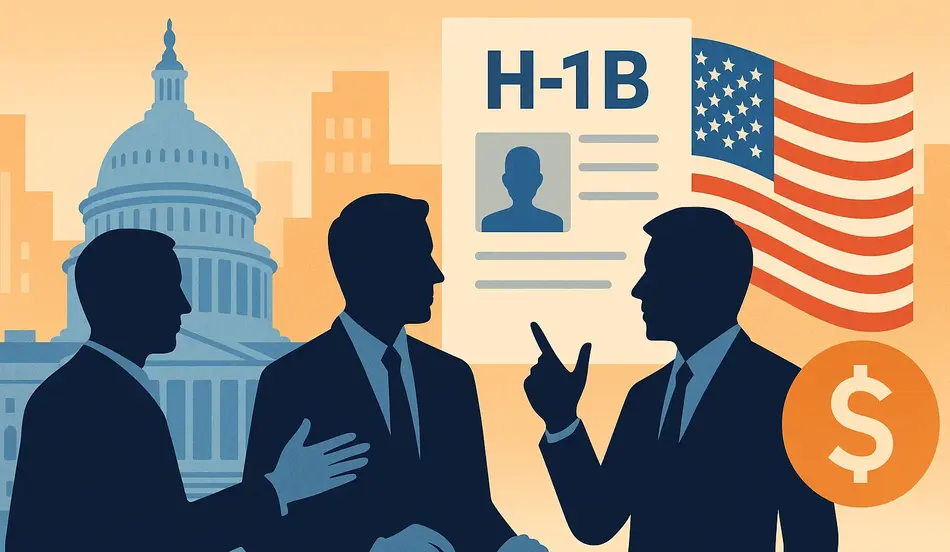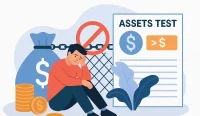Jamie Dimon H-1B visa changes – the JPMorgan Chase CEO has become the latest high-profile business leader to sound off on the Trump administration’s controversial changes to H-1B visas, with the president announcing they’ll soon cost $100,000 for new workers. Speaking with CNBC TV18 in India during the bank’s summit there, Dimon revealed that the changes caught everyone off guard, while expressing his support for merit-based immigration and calling for a balanced approach to border control and talent acquisition.
Dimon’s comments come as major tech leaders including Nvidia CEO Jensen Huang and OpenAI CEO Sam Altman have also weighed in on the H-1B visa changes, highlighting the critical importance of immigration to their companies and America’s future. The debate has sparked intense discussion on social media, with supporters arguing that the system has been abused for years, while critics warn that the $100,000 fee will devastate American innovation and competitiveness.
The $100,000 Fee: A Shock to the System
The Trump administration’s announcement of a $100,000 fee for new H-1B visa applicants has sent shockwaves through the business community, with major corporations scrambling to understand the implications for their talent acquisition strategies. Dimon’s response during the CNBC interview reveals the depth of concern among business leaders about the potential impact on their operations.
The average H-1B visa holder earns $167,165, according to recent data, making the $100,000 fee a significant additional cost that many companies may struggle to absorb. For smaller businesses and startups, the fee could be prohibitive, effectively pricing them out of the international talent market.
The timing of the announcement has been particularly problematic, with many companies already in the middle of their hiring cycles and planning for 2026 when the new fee takes effect. The lack of advance notice has created uncertainty and forced businesses to reconsider their long-term talent strategies.
Dimon’s Call for Merit-Based Immigration
Dimon’s response to the H-1B visa changes reflects a nuanced approach to immigration policy that balances border security concerns with the need for skilled talent. “I believe in merit-based immigration,” Dimon stated during the interview. “I think I would beg the president if he has accomplished border control, that’s great. I mean, I think all nations want real border control. It helps make a nation. But after that, we should have good immigration.”
This statement reveals Dimon’s support for a two-tier approach to immigration policy: securing the border first, then implementing a merit-based system that allows skilled workers to enter the country. This approach aligns with the concerns of many business leaders who recognize the importance of both security and talent acquisition.
Dimon’s comments also suggest that he sees the H-1B visa system as part of a broader immigration strategy that should be reformed rather than simply made more expensive. His call for “good immigration” implies support for a system that attracts the best and brightest while maintaining appropriate controls.
The Tech Industry’s Response: Innovation vs. Protectionism
The H-1B visa changes have drawn strong responses from major tech companies, with Nvidia CEO Jensen Huang and OpenAI CEO Sam Altman both emphasizing the critical importance of immigration to their companies and America’s future. Huang stated that immigration is critical to his company and America’s future, while Altman emphasized the importance of bringing the smartest people into the US.
These comments reflect the tech industry’s dependence on international talent, particularly in specialized fields like artificial intelligence, machine learning, and advanced engineering. The industry has long argued that H-1B visas are essential for maintaining America’s competitive advantage in technology and innovation.
However, the debate has also highlighted concerns about potential abuse of the system. Critics argue that the H-1B program has been used to hire lower-cost workers from India and other countries at the expense of qualified American workers, particularly in non-high-tech roles.
The Abuse Argument: Valid Concerns or Protectionism?
The debate over H-1B visa abuse has become a central theme in discussions about the $100,000 fee. Critics argue that the system has been exploited for years, with companies using H-1B visas to hire workers at below-market rates rather than investing in training American workers.
Key concerns about H-1B abuse include:
• Below-market salaries – Some companies pay H-1B workers less than American workers • Displacement of American workers – H-1B workers may replace qualified American candidates
• Lack of training investment – Companies may use H-1B visas to avoid training American workers • Geographic concentration – 71% of visas go to people from India, 11% from China
• Remote work concerns – Some H-1B workers may be working remotely from their home countries
The 6% unemployment rate for recent graduates, which is higher than the average unemployment rate, has also raised questions about whether there are enough qualified American workers to fill available positions.
H-1B Visa Changes: A CEO’s Warning
JPMorgan CEO Jamie Dimon’s response to the proposed $100K H-1B visa fee highlights the risk of losing global talent and innovation. Employers can take action now by diversifying their pipelines and connecting with skilled professionals worldwide. Post your job on WhatJobs today and reach top talent ready to make an impact — free for 30 days.
Post a Job Free for 30 Days →The Magnificent 7: Big Tech’s Dominance of H-1B Visas
The concentration of H-1B visas among major tech companies has become a focal point of the debate. Amazon holds 10,000 of these visas, while Meta and Microsoft each hold approximately 5,000. The “Magnificent 7” companies (Amazon, Meta, Microsoft, Apple, Alphabet, Tesla, and Nvidia) account for almost 28,000 H-1B visas—nearly half of all visas issued.
This concentration has led to calls for targeted reforms that focus on the companies most likely to abuse the system. Some argue that these large tech companies have the resources to pay the $100,000 fee and should be required to do so, while smaller companies that genuinely need specialized talent should receive exemptions or reduced fees.
The debate raises questions about whether the solution should be a blanket fee increase or a more nuanced approach that targets specific abuses while preserving access to talent for companies that use the system appropriately.
The Innovation Trade-off: Jobs vs. Competitiveness
The H-1B visa debate ultimately comes down to a fundamental trade-off between protecting American jobs and maintaining America’s competitive advantage in innovation. Proponents of the $100,000 fee argue that it will create more jobs for American workers and force companies to invest in domestic talent development.
However, critics warn that the fee could have unintended consequences that ultimately harm American competitiveness. If companies cannot access the specialized talent they need, they may:
• Relocate operations overseas – Move research and development to countries with more favorable immigration policies
• Reduce innovation – Slow down technological advancement due to talent shortages
• Lose competitive advantage – Fall behind other countries in key technology areas
• Impact rural areas – Reduce access to specialized professionals like doctors in underserved areas
The administration has responded to some of these concerns by suggesting that exemptions could be made for positions deemed important to the country, such as healthcare workers in rural areas.
The Political Dimension: Economic Nationalism vs. Global Talent
The H-1B visa debate reflects broader tensions between economic nationalism and the need for global talent in an interconnected world. The Trump administration’s approach emphasizes protecting American workers and reducing dependence on foreign talent, while business leaders argue that America’s success depends on attracting the best and brightest from around the world.
This tension is evident in the discussion about “Made in America” movements and the willingness of consumers to pay more for domestically produced goods. While there is political support for policies that prioritize American workers, the economic reality is more complex.
The debate also highlights the challenge of balancing short-term job protection with long-term economic competitiveness. While restricting H-1B visas may create immediate jobs for American workers, it could also reduce America’s ability to innovate and compete globally.
The Future of H-1B Visas: Reform or Restriction?
The H-1B visa changes represent a significant shift in immigration policy that will have far-reaching implications for American businesses and the economy. The $100,000 fee is likely to reshape the talent acquisition landscape, forcing companies to reconsider their hiring strategies and potentially accelerating the trend toward remote work and global talent sourcing.
The debate over H-1B visas is likely to continue as businesses adapt to the new reality and policymakers assess the impact of the changes. The key question is whether the new fee will achieve its intended goals of protecting American workers while maintaining America’s competitive advantage, or whether it will have unintended consequences that ultimately harm the economy.
The future of H-1B visas may depend on finding a balance between preventing abuse and maintaining access to the specialized talent that drives innovation and economic growth. This will require careful monitoring of the impact of the changes and potentially adjusting the policy based on real-world results.
Frequently Asked Questions
What is Jamie Dimon H-1B visa changes response?
Jamie Dimon H-1B visa changes response shows the JPMorgan CEO supporting merit-based immigration while expressing concern about Trump’s $100K fee, calling for balanced border control and talent acquisition policies.
How does the $100K H-1B fee affect major tech companies?
The $100K H-1B fee affects major tech companies significantly, with Amazon holding 10,000 visas, Meta and Microsoft each holding 5,000, and the Magnificent 7 companies accounting for nearly half of all H-1B visas issued.
How do H-1B visa changes impact American innovation?
H-1B visa changes could impact American innovation by forcing companies to relocate operations overseas, reducing access to specialized talent, and potentially slowing technological advancement and economic competitiveness.
What is the concentration of H-1B visas among tech companies?
H-1B visas are highly concentrated among tech companies, with 71% going to people from India, 11% from China, and the Magnificent 7 companies holding almost 28,000 visas—nearly half of all visas issued.
How does the 6% unemployment rate for graduates affect the H-1B debate?
The 6% unemployment rate for recent graduates, which is higher than the average rate, raises questions about whether there are enough qualified American workers to fill available positions, fueling the H-1B visa debate.
What exemptions might be available for the $100K H-1B fee?
The administration has suggested exemptions could be made for positions deemed important to the country, such as healthcare workers in rural areas, though specific criteria and implementation details remain unclear.
A Real-World Example: The Tech Startup’s Dilemma
Alex Chen, founder of a Silicon Valley AI startup, found himself caught in the middle of the H-1B visa debate when the $100,000 fee was announced. “We have three H-1B employees who are absolutely critical to our product development,” he explains. “They’re brilliant engineers who came to the US for graduate school and have been with us for two years.”
Alex’s startup, which has raised $3 million in seed funding, simply cannot afford to pay $300,000 in visa fees for his three H-1B employees. “We’re already operating on a tight budget, and this would essentially bankrupt us,” he says. “We’re now seriously considering relocating our entire engineering team to Canada.”
Alex’s story illustrates the real-world impact of the H-1B visa changes on smaller companies. “These aren’t jobs that Americans are lining up to fill,” he explains. “We’ve tried to hire locally, but the specialized skills we need in AI and machine learning are incredibly rare. Our H-1B employees are the reason we can compete with larger companies.”
The startup is now exploring options in Toronto, where the Canadian government has been actively recruiting tech talent. “It’s heartbreaking to think about leaving the US, but we have to do what’s best for our business and our employees,” Alex says. “The new visa fee is essentially forcing us to take our innovation elsewhere.”
Alex’s story shows how the H-1B visa changes will drive innovation and talent out of America, exactly the opposite of what the policy was intended to achieve.
Don’t Let Immigration Policy Destroy American Innovation
The H-1B visa changes represent a fundamental threat to American innovation and competitiveness. While the policy may be intended to protect American workers, it will actually drive talent and innovation overseas, weakening the very economy it’s meant to strengthen.
Companies must act now to prepare for the new reality. Whether through alternative visa categories, international expansion, or developing domestic talent pipelines, businesses need to adapt to maintain their competitive advantage.
The stakes are high, and the time to act is now. Don’t let short-sighted immigration policy destroy your business’s ability to compete in the global economy.




